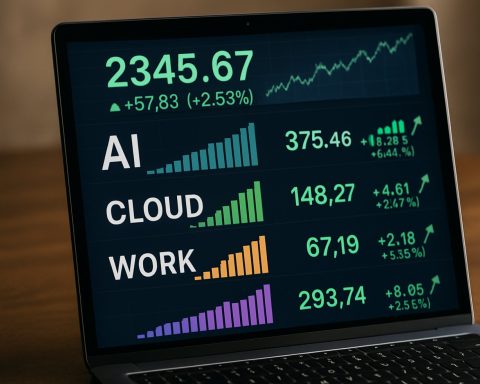- Palantir Technologies experienced a significant stock drop of 10.6% amid global market jitters influenced by new trade tariffs.
- The introduction of expansive tariffs by the U.S., particularly a 34% tariff on Chinese imports, contributed to the market volatility affecting companies like Palantir.
- Despite its digital nature, Palantir remains vulnerable to economic downturn risks and market concerns, reflected in its steep share price decline.
- Palantir’s high valuation, with a P/E ratio over 400, suggests a fragile position in the face of ongoing economic uncertainties.
- Investors are reminded of the complex influences of global policies on businesses, emphasizing the need for heightened vigilance and adaptability.
A chilling breeze swept through the stock markets last Friday, leaving few feathers unruffled, and Palantir Technologies found itself caught in the tempest. With the landscape of global commerce echoing with the clang of new tariffs, it seemed no corner of the financial world was safe from its ripples. While the S&P 500 and Nasdaq Composite stumbled with losses exceeding 5%, Palantir’s shares took a sharper plunge, tumbling a dramatic 10.6% by mid-afternoon—at one point dipping even further to 14%.
Palantir, a name synonymous with cutting-edge artificial intelligence software, is now embroiled in an intricate dance with the evolving trade war. This software titan, known for its prowess in weaving complex data analytics, seemed insulated from the raw nerve of tariff-driven upheavals. Its products, purely digital and free from the shackles of cross-border logistics, presumably protected it from immediate tariff impacts. Yet, in the unpredictable theater of global economics, not even Palantir could escape unscathed.
The catalyst for the stock’s volatility traces back to President Donald Trump’s audacious introduction of expansive tariffs. With a worldwide swipe, these measures slapped a weighty 34% tariff on Chinese imports, alongside a hefty levy on goods from Europe and other nations. Such overwhelming trade actions echoing back to the heavy protectionist policies of the 1930s sent swift tremors through financial sectors.
On the surface, Palantir stood apart from the fray, seemingly avoiding the initial sting that tech hardware giants faced. Still, the retaliatory response from China—a soaring 34% tariff on U.S. imports—sharpened the threat of a broader economic downturn. Even those shielded from immediate tariff effects, like Palantir, couldn’t escape concerns of a tightened market purse, as fears of recession loomed like dark clouds overhead.
This precarious atmosphere unfurls a critical challenge for Palantir. Despite its recent descent—a startling 40% drop in share price over the preceding months—its valuation remains precariously high, with a price-to-earnings (P/E) ratio towering over 400. In the scrutinizing lens of global uncertainty, such elevated valuations reveal a stock as delicate as gossamer, demanding operational perfection amidst tumultuous times.
Indeed, the unfolding narrative paints a vivid picture of vulnerability. As investors navigate these turbulent waters, the unfolding tariff tale serves as a stark reminder: even mighty data wizards like Palantir can find themselves at the mercy of macroeconomic tides, underscoring the intricate web of influence that global policies can cast over individual enterprises. In such times, awareness and adaptability are crucial, shining a light on the necessity for investors to keep a vigilant watch on the broader economic canvas.
Why Palantir’s Stock is Plummeting: The Real Impact of Tariffs and Economic Uncertainty
Understanding the Impact of Global Tariffs
The recent stock market volatility brings Palantir Technologies into the spotlight, particularly in the context of newly imposed global tariffs. While Palantir specializes in AI software and is less directly affected by tariffs compared to manufacturers, the indirect consequences of a trade war can still significantly impact its performance.
How Tariffs Influence Tech Stocks
1. Economic Slowdown Concerns: Although Palantir’s operations are largely unaffected by direct tariffs, the broader economic slowdown could lead to reduced government and corporate spending on technology solutions, impacting revenue streams for companies like Palantir.
2. Market Sentiment and Valuation Risks: With a P/E ratio exceeding 400, Palantir’s valuation is under intense scrutiny. High valuations are vulnerable during economic uncertainties, as investor risk aversion tends to favor more stable sectors.
3. Investment Strategy Amidst Volatility: Smart investment in times of market unpredictability requires a focus on diversified portfolios to mitigate risks associated with high-volatility stocks like Palantir.
Real-World Use Cases and Market Insights
– Government and Defense Contracts: Palantir has substantial engagements with government agencies for data analytics, which might face funding adversities in a tightened economic environment.
– Commercial Sector Expansion: Expanding into the commercial sector is crucial for Palantir to balance dependency on government contracts. The tech giant’s ability to innovate in this space could cushion some impact of the tariffs.
– Global Expansion Challenges: Any moves to expand operations internationally could be hampered by fluctuating trade dynamics, thus impacting long-term strategic planning.
Pros and Cons of Palantir’s Market Position
Pros:
– Industry-leading AI capabilities.
– Strong government contract base.
Cons:
– High valuation, leading to susceptibility in unstable markets.
– Dependence on large contracts that may be affected by budget constraints.
Actionable Recommendations for Investors
– Diversification: Consider a balanced portfolio that includes a mix of technology stocks with more stable sectors like consumer goods or utilities.
– Monitor Economic Indicators: Stay updated on key economic indicators and geopolitical developments that might further influence market dynamics.
– Review Valuation Metrics: With high P/E ratios for Palantir, investors should scrutinize financial health and earnings growth forecasts.
Insights and Predictions
Economic volatility is anticipated to persist in the short-term, but companies focusing on AI and big data, like Palantir, may eventually benefit from increased demand for analytic solutions in an evolving digital world. However, this is contingent upon economic recovery and stabilization of global trade policies.
For more detailed insights into market dynamics and investment strategies, explore resources on Nasdaq or MarketWatch.
Stay informed and strategic, and prioritize diversification to safeguard against market unpredictability.







